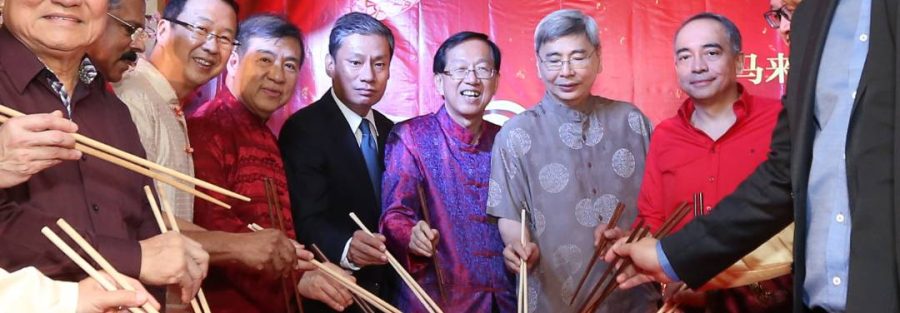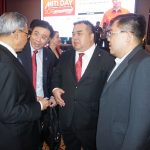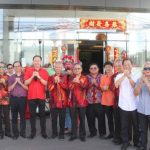
Malaysia-China Chamber of Commerce (MCCC) held the 2018 Chinese New Year Celebration at The Federal Kuala Lumpur on 24 Feb (9th day of Chinese New Year). There were 40 seats, attracting 400 representatives from politics, economics, culture and education.
Tan Yew Sing, President of MCCC, expressed his gratitude for the support, cooperation and assistance rendered over the past year.
Tan pointed out that for the Chinese community, New Year reflects the rhythm of the peasants’ lives. Such tradition lasted for 3,000 years in China and Asia.
With the development of science and technology, a lot of new technologies have been deeply integrated into life nowadays and thus giving birth to the countless new ways of celebrating Chinese New Year.
Especially in the era of mobile Internet and young people who are accustomed to “mobile” lifestyle. Shopping, entertainment, travel, social networking, red packet as well as blind dates can all be done with one click.

In the era of high competition and intelligence focusing on artificial intelligence (AI), shared economy, e-commerce and the “Internet+” strategic industries, our country must strongly consider leveraging technology to promote traditional industries, and to drive development with innovation.
“The expansion of the world’s population has aggravated human consumption of the earth’s resources. Modern agriculture has been developing towards the direction of knowledge intensive and high efficiency,” Tan said.
A good example is the Malaysian Rubber Board. Under the leadership of Datuk Seri Mah Siew Keong, the Malaysian Rubber Board is actively conducting innovative research with high value-added benefits, to foster high quality, high yield, high disease-resistance, and shorter maturity varieties of rubber trees. This innovation of science and technology promoted by the government would help small rubber plantation owners to carry out systematic management, and in turn improving the yield of rubber harvest.
China’s Excellent Agricultural Technology to Take Root in ASEAN
Looking forward to the future, with the increasingly close cooperation between China and ASEAN, more and more China agricultural enterprises would make their foray into ASEAN countries.
It can be predicted that more and more China technology “genes” would be injected into the exceptional ASEAN products of high quality and low cost, so that China’s excellent agricultural technology would take root and bear fruit on the ASEAN soil.
Malaysia is richly endowed by nature and hence rich in natural resources. The government and the business community should tap into the current favorable China-Malaysia economic and trade relations as the basis, with technological innovation as the goal, accept and learn the accumulated technological achievements of China with an open attitude, in order to better foster and enhance our various traditional industries.
Strengthen Tourist Facilities
Tan added that we also see that taking holidays is a popular way for the Chinese in celebrating the traditional Spring Festival. According to the “2018 Spring Festival Outbound Travel Trend Forecast Report” jointly issued by the China Tourism Research Institute and Ctrip Tourism, it was estimated that the number of outbound tourists would reach 6.5 million this Spring Festival holiday, the largest in history.
Fortunately, in order to cater for a large number of China tourists during the Chinese New Year, the Ministry of Tourism and Culture Malaysia had issued 200 temporary tour guide licenses, and 2,200 China tour guides are ready to receive these China tourists.
The Malaysia Inbound Tourism Association (MITA) estimated that this year’s Chinese New Year would usher in 250,000 China tourists, increasing from about 200,000 last year.
According to the data of the United Nations World Tourism Organization, China’s outbound tourists account for 1/5 of the world’s total consumption, which is two times the consumption of tourists from the United States, and the figure is expected to rise.
As a popular tourist destination in Southeast Asia, Malaysia should strengthen both soft and hardware facilities, such as Chinese language signage, Mandarin-speaking tour guides, including introducing innovation of science and technology such as mobile phone payment system, in order to stand out among popular tourism destinations in neighbouring countries or around the world, so to continue to win the heart of China tourists.
In any case, the outbound of China tourists during the Spring Festival holiday brings abundance of business opportunities, while promoting greater exchanges and interaction between Chinese and foreigners, contributing to promoting “people-to-people connectivity.” The people of Malaysia and China should take advantage of this opportunity to get to know each other and continue the spirit of the friendly relations between the two countries.
MCEC 2018 in Nanjing, MIIE First Held in November
Tan also announced that in response to the high-intelligence trend, the MCCC is in full swing preparing for the first Malaysia International Inno-Tech Expo (MIIE) in November this year at the capital city landmark Kuala Lumpur Convention Center. The purpose of this expo is to promote the economic development of our country with the scientific and technological innovation as its theme and to create the ideal ecological environment for small and medium-sized enterprises, especially young entrepreneurs, in starting business.
The annual major event of MCCC, the Malaysia-China Entrepreneur Conference (MCEC) had received overwhelming response in 2017 and gain high attention from China. This year, we are proud to announce that we have secured the recognition and confirmation of Jiangsu Department of Commerce to bring this year’s conference from Malaysia to Nanjing in Jiangsu Province. Again, this year, MCEC will continue to focus on quality instead of quantity, and to this end, we would like to call on local entrepreneurs with strong ambition and clear understanding of economy and trade between Malaysia and China to join us in this conference, in order to create more specific business opportunities and achieve an even fruitful outcome.
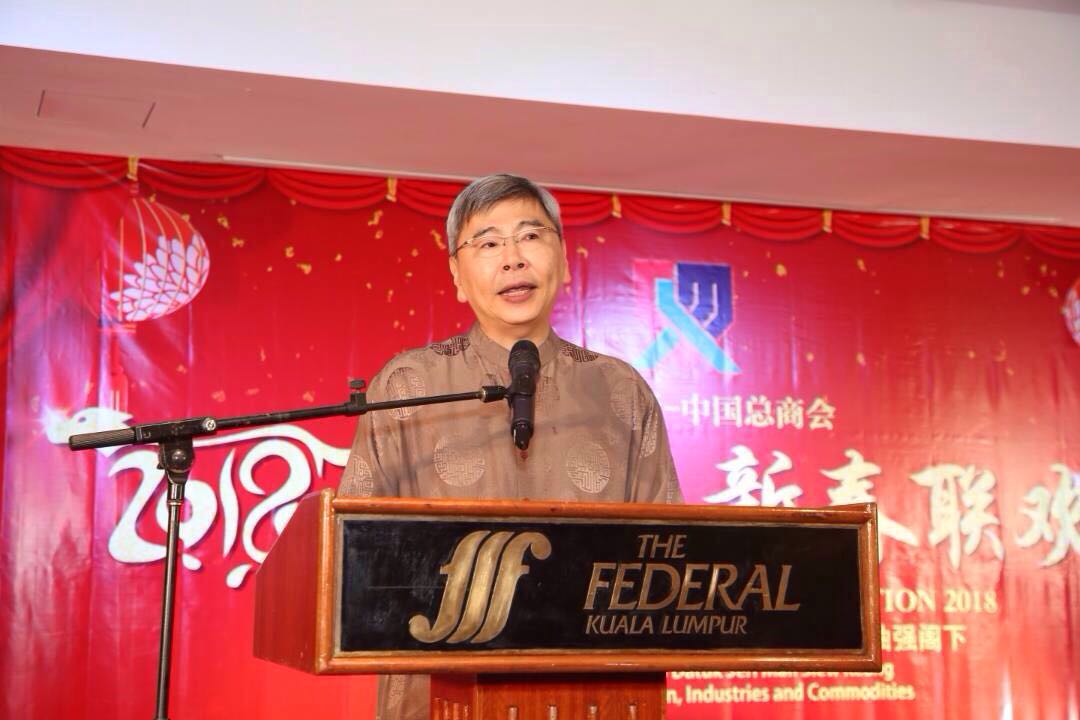
The Minister of Plantation Industries and Commodities (MPIC), YB Datuk Seri Mah Siew Keong, said that as the European Union refused to import palm oil, Malaysia should find another way, such as targeting the China market. As China is the second largest importer of palm oil and related products in the country. Last year, the imported products had a total of HKD9,420 million, a 6% increase from RM8,850 million in 2016.
“This is very important to our country because when we face a crisis, a good friend (China) stands up and speaks. This signifies the relation between Malaysia and China is getting better,” Mah said.
Mah expressed his gratitude to H.E. Bai Tian, Ambassador Extraordinary and Plenipotentiary of the People’s Republic of China to Malaysia who visited the department for the first time at the press briefing by mentioning that China sets no restrictions on the import of Malaysian palm oil and that no relevant laws restrict it.
Mah added to encourage China to invest in Malaysia, especially the palm oil, industries and commodities, because China has a huge consumer market.
On rubber, Mah said that China imported Malaysian rubber products and related products worth about RM8.1 billion last year, a 70% increase or nearly RM4 billion compared with RM4.8 billion in 2016.
“The world’s best biomass energy industrial technology is in China. At present, Malaysia’s most potential industry is biomass industry. Our country has a large number of palm oil, we hope that China investors will invest together with local entrepreneurs in this potential industry and the rubber industry,” Mah added.
Not Compromising EU Discrimination
“Although Malaysia is a trading country, Malaysia needs to maintain good relations with other countries in the world. However, it will not compromise on discrimination against palm oil in some countries,” Mah said.
“The EU is Malaysia’s largest importer of palm oil and related products with an average annual import value of RM11 billion in palm oil and related products in Malaysia, which is a huge sum because Malaysia exports 2 million tons of palm oil every year to Europe, of which 30 % of the oil used for biodiesel purpose. Therefore, the relevant resolution will have an impact on Malaysia, the world’s second largest palm oil producer, and also had an impact on Thailand, the largest producer, and Thailand, the third largest producer.
The European Parliament passed the ban on imports of palm oil into the region on January 2021 to prevent deforestation. After voting to exclude palm oil derived biofuels from the EU’s renewable energy sources, the European Commission and the European Council need to agree with it. The relevant process will take several months. Mah said that the production of other vegetable oils like soya bean oil, sunflower oil and rapeseed oil contribute to deforestation too. However, they can be used until 2030, which is unfair with the refusal of palm oil in 2021.
Mah added that the EU, comprised of 28 countries, passed the resolution after the parliament passed the individual consent of 28 countries.
“Before the Chinese New Year, I visited the governments of the six largest EU countries and five of them do not agree with this bill,” Mah said.
“They (28 countries) will meet in few months and I am confident that they (the 5 countries) will not agree with the decision,” Mah added.
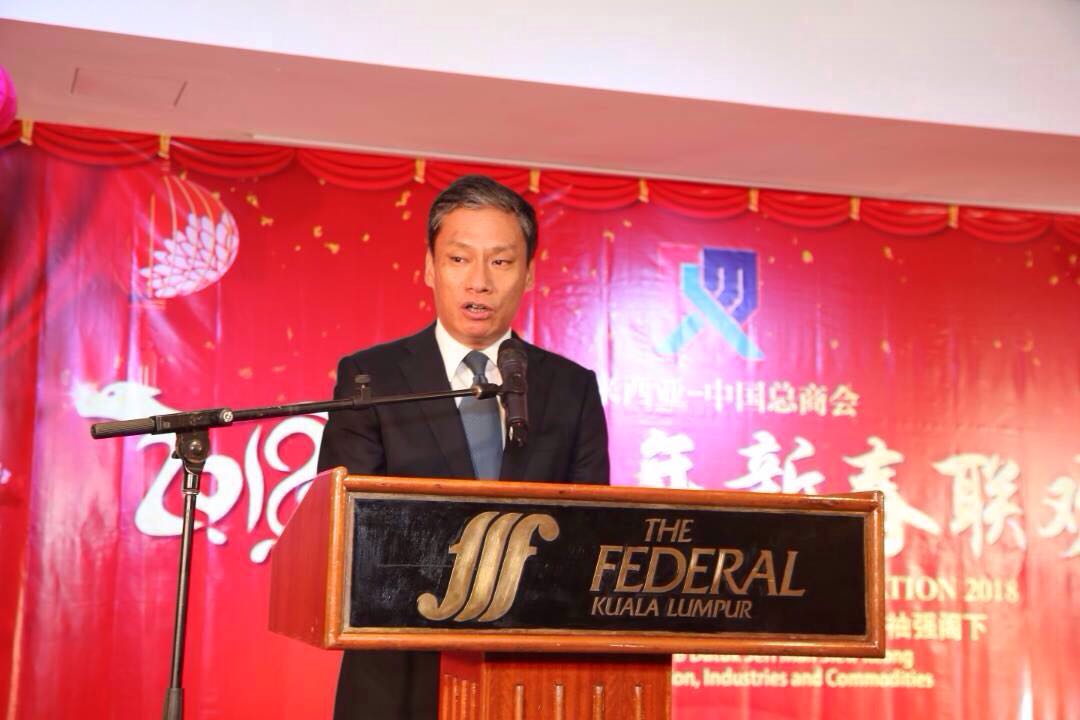
“This is the first Spring Festival I spent in Malaysia, the festive decorations, dragon dance, lion dance, prosperity toss (Yee Sang) and toasting (Yum Sheng) are everywhere. The peaceful festive atmosphere left a deep impression on me as if I was celebrating back at my hometown,” Chen Chen, Minister Counselor of the Embassy of China in Malaysia said.
In addition, Chen believed that in the era of globalization, some European countries adopted the closed-door policy. He described the move as going against the trend.
The world economy is disrupted a little. Some powerful and wealthy countries have taken the closed-door policy approach in this era of globalization. Some did not want to stay in the alliance. This is actually going against the trend of the world.
Chen reiterated that China will always welcome Malaysian products. The embassy of China will strengthen the co-operation between the two governments, departments and businesses to bring in palm oil, durian, bird’s nest and other agricultural products into the China market.
Chen pointed out that China welcomes Malaysian businessmen and products entering the China market and hopes to strengthen exchanges and cooperation with Malaysia at all levels so as to create more points of interests and cooperation for growth and shared opportunities for development to achieve results that truly benefit both countries’ citizens.
Chen said that China has made some economic achievements with the support of the overseas Chinese and some savings after 40 years of reformation and its open door policy.
“Therefore, we come up with the ‘Belt and Road initiative’ as we hope to share our successful experience with the rest of the world. We hope that with the progress of China, we can move towards a steady development of the world economy,” Chen said.
Chen said that China’s GDP for last year exceeded USD12 trillion (about RM47 trillion), ranking second in the world with a growth rate of 6.9%. Its economic structure has been continuously optimised and the quality of its development has steadily risen.

